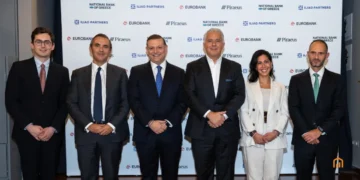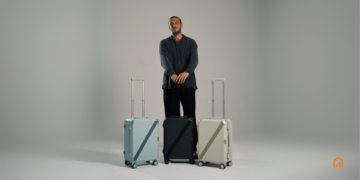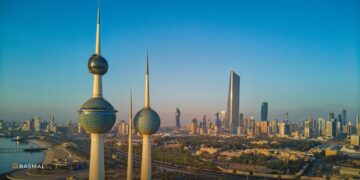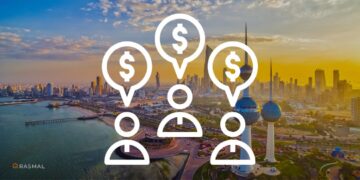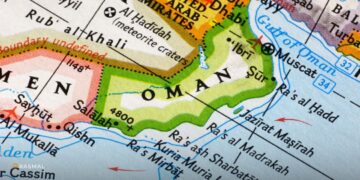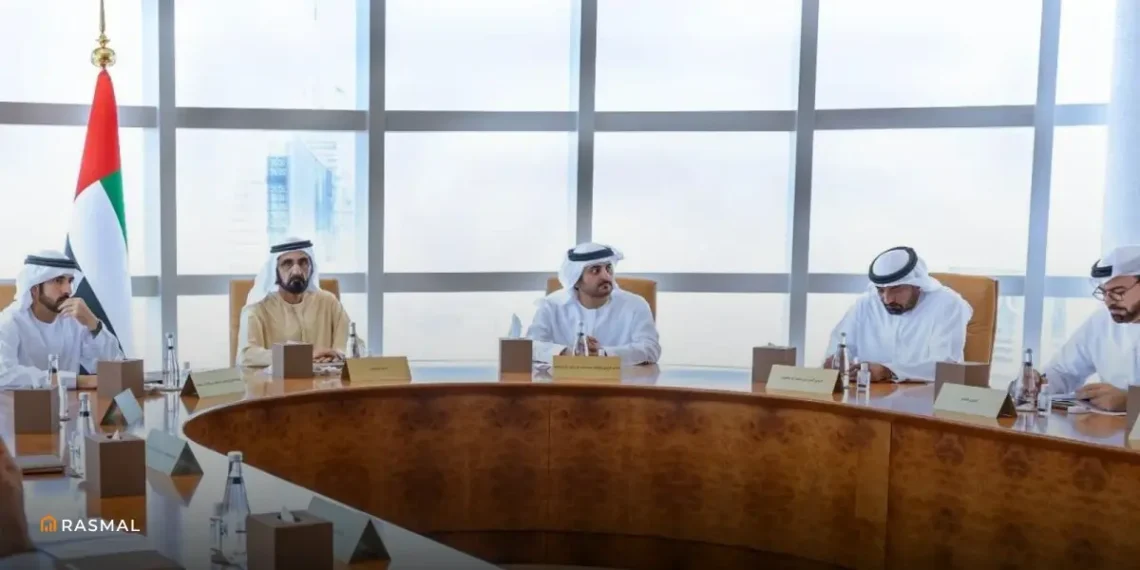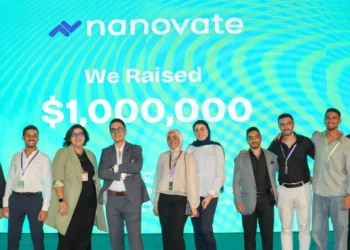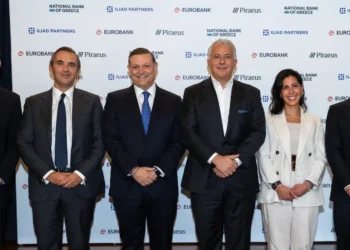- Dubai surpasses trade targets, aiming for AED25.6 trillion ($7 trillion) in the next decade.
- Dubai aims for the top three global urban economies, highlighting its commitment to economic growth.
- Dubai Customs introduces unique strategies to enhance business interactions and foster sustainable economic development.
Dubai’s remarkable trajectory towards becoming a global trade powerhouse is marked by its recent surpassing of trade targets and ambitious aspirations. With a steadfast commitment to excellence, Dubai has exceeded expectations, solidifying its position as a premier international trade hub.
The emirate’s relentless pursuit of economic growth has propelled it towards its goal of ranking among the top three urban economies worldwide. Already surpassing previous trade benchmarks, Dubai now sets its sights on achieving an impressive AED25.6 trillion ($7 trillion) in trade over the next decade.
This milestone underscores Dubai’s unwavering determination to shape the future of global commerce and reinforces its status as a beacon of innovation and prosperity on the world stage. As Dubai continues to surpass milestones ahead of schedule, its influence as a dynamic and thriving economic centre only continues to grow.
Trade Targets of Dubai
Sheikh Hamdan bin Mohammed bin Rashid Al Maktoum, Crown Prince of Dubai and Chairman of The Executive Council of Dubai reiterated Dubai’s commitment to bolstering its status as a premier global trade and logistics hub. Under the guidance of Sheikh Mohammed bin Rashid Al Maktoum, Vice President and Prime Minister of the UAE and Ruler of Dubai, Dubai has consistently surpassed expectations in its growth trajectory and objectives outlined in the Economic Agenda, D33.
This initiative, spearheaded by Sheikh Mohammed, aims to propel Dubai into the top three urban economies worldwide, enhance its economic and trade competitiveness, and broaden its international trade horizons. Sheikh Hamdan emphasized the city’s ongoing efforts to achieve these ambitious goals, reflecting Dubai’s unwavering dedication to economic advancement and global prominence in trade and commerce.
Also Read: Top 20 Logistics Companies In DubaiSheikh Hamdan emphasized that the sustained increase in non-oil foreign trade volume demonstrates Dubai’s robust and fruitful collaborations with key global partners, as well as the flourishing alliance between the public and private sectors.
Sheikh Hamdan highlighted Dubai’s success, attributing it to continuous efforts to maintain its leading position across diverse economic sectors. He emphasized the exceptional performance of the non-oil foreign trade sector, which reinforces Dubai’s role as a key trade hub connecting various regional and global markets.
He noted Dubai’s attractiveness to businesses seeking expansion due to its strategic location, transparent commercial processes, and top-notch facilities that enhance the ease of doing business. Dubai’s tireless efforts ensure all necessary elements are in place to sustain its economic prowess.
Sheikh Hamdan’s remarks underscore the city’s commitment to remaining a prime destination for traders and businessmen, offering unparalleled advantages for companies looking to grow within the region and beyond.
Sheikh Hamdan highlighted Dubai’s remarkable growth in non-oil trade, reaching AED2 trillion ($544.6 billion) in 2023, a year ahead of schedule. This achievement underscores Dubai’s unique business approach. Despite global challenges to supply chains, the emirate has shown resilience, enhancing competitiveness and positioning itself as a leader in global trade transformations.
Dubai remains committed to its economic objectives outlined in D33, aiming to increase foreign trade from AED14.2 trillion ($3.9 trillion) over the past decade to AED25.6 trillion ($7 trillion) in the next decade. This steady progress reflects Dubai’s determination to drive economic growth and solidify its position as a global trade hub.
The emirate of Dubai has seen impressive growth in its non-oil foreign trade, thanks to significant investments in advanced technologies by Dubai Customs. In 2023, the department processed over 26.5 million customs declarations, a notable increase from the 22.5 million declarations processed in 2022, marking an 18% growth.
Moreover, there was a 15% rise in the volume of goods traded by land, along with increases of 9% in goods transported by air and 8% by sea during the same period. This surge in trade activity reflects Dubai’s commitment to enhancing its logistical capabilities and streamlining customs procedures.
Sultan bin Sulayem, Chairman and CEO of DP World Group and Chairman of Ports, Customs, and Free Zone Corporation, highlighted that upon the announcement of Sheikh Mohammed Bin Rashid’s five-year plan, an immediate response ensued. Under his leadership, a dedicated team was formed, initiating an ambitious program.
The objective of this program is to attain Dubai’s target of AED 2 trillion ($544.6 billion) by 2025. It primarily focuses on doubling the value of non-oil foreign trade, encompassing exports, imports, and re-exports. This strategic initiative aims to bolster Dubai’s economic growth and diversification, positioning it as a global trade hub.
A team of strategic partners from Dubai Customs, including government and private entities, is working together to assess current conditions and propose and implement initiatives. These initiatives may include incentives, legislative changes, or logistical improvements. Their main goal is to boost Dubai’s competitiveness and strengthen its global trade position by seamlessly connecting the world’s regions.
Despite the challenges posed by the global COVID-19 pandemic, the program has successfully navigated through this difficult phase. This showcases Dubai’s remarkable ability to support resilient global supply chains and lead the recovery in the commercial sector.
Sultan bin Sulayem, Chairman and CEO of DP World Group and Chairman of Ports, Customs, and Free Zone Corporation, unveiled a comprehensive program aimed at facilitating trade, enhancing profits for businesses, and opening new commercial opportunities.
One of the key initiatives within this program is the introduction of a cross-border e-commerce platform leveraging blockchain technology to streamline supply chains. The platform’s primary objective is to bolster the market presence of Dubai-based companies in both local and regional e-commerce markets. By leveraging blockchain and other innovative solutions, the initiative aims to reduce overall e-commerce operation costs by up to 20 per cent.
This move aligns with Dubai’s commitment to fostering a conducive environment for trade and commerce, ensuring that businesses can thrive in an increasingly digital and interconnected global marketplace.
Furthermore, the authorized economic operator program strengthens ties between UAE customs and those of various countries, including South Korea, China, India, Indonesia, and Gulf Cooperation Council nations. This is accomplished through mutual recognition agreements aimed at facilitating secure trade exchanges with these partners.
These initiatives prioritize streamlining business processes, aiming to simplify procedures and enhance efficiency for businesses engaging in international trade. Through such collaborations and agreements, the UAE aims to foster smoother trade operations, benefiting both domestic and international businesses by reducing bureaucratic hurdles and ensuring a more seamless flow of goods across borders.
Ahmed Mahboob Musabih, Director General of Dubai Customs and CEO of Ports, Customs, and Free Zone Corporation, highlights Dubai Customs’ dedication to fostering growth in the city’s international trade. With a focus on providing exceptional services and facilities, Dubai Customs operates digitally 24/7, managing approximately 85,000 transactions daily.
This figure is expected to rise as Dubai’s trade continues to flourish, attracting more trading companies to establish bases in the city. Emphasizing its commitment to digital transformation, Dubai Customs proudly conducts all 100 per cent of customs transactions through intelligent systems, achieving an impressive 98% customer satisfaction rate.
By embracing paperless processes, they showcase leadership in smart technology adoption and digital empowerment. This streamlined approach not only enhances efficiency but also ensures a seamless experience for traders operating within Dubai’s bustling trade environment.
Dubai Customs is steadfast in its commitment to improving digital customs services, aiming to simplify processes and boost customs transactions. Thanks to innovations like the Smart Workspace platform, customs declarations now take only 4 minutes, significantly expediting procedures.
This efficiency has played a key role in the success of Dubai’s non-oil foreign trade, which has surpassed expectations by reaching a value of AED 2.1 trillion ($572 billion) ahead of schedule. By prioritizing digital advancements, Dubai Customs aims to ensure smoother operations and further stimulate trade growth in the region.
The ‘Shipment Status Tracking’ project improves customer satisfaction by allowing swift actions based on shipment status, assisting over 200,000 clients including importers, Customs brokers, shipping, and transport companies. This boosts transparency in goods clearance and supports 24/7 operations.
Another innovative initiative, “Post Audit Robotic Process Automation (PCA-RPA),” aims to automate customs auditing using AI technologies. This initiative targets the auditing of Customs declarations, particularly for high-value goods, categories, and customs conditions handled annually by Dubai Customs. The objective is to achieve 100% coverage within the next five years.
Dubai Customs has implemented flexible customs policies aimed at streamlining trade operations and bolstering Dubai’s global competitiveness in business facilitation. These policies have played a significant role in attracting increased foreign direct investment. In 2023 alone, Dubai Customs issued 13 customs notices and policies.
These documents provide detailed information crucial for traders to navigate customs transactions transparently, facilitating a smooth and hassle-free business process. The policies cover a range of topics including explanations of the latest digitally accessible services, updates on goods classification, and procedures related to economic partnership agreements. By offering clarity and simplifying procedures, these initiatives contribute to fostering a conducive environment for trade and investment in Dubai.
Dubai Customs places a high priority on customer satisfaction, achieving an impressive rate of 95.4% according to the 2023 Government Customer Happiness Index survey. To enhance business interactions and address challenges effectively, Dubai Customs has introduced various innovative initiatives.
These initiatives serve as vital platforms for engaging with customers, facilitating proposal discussions, and fostering stronger ties between the government and private sectors. By fostering open communication channels, Dubai Customs aims to contribute to sustainable economic development in the region.
Follow us on Instagram, LinkedIn, and Twitter for startup & business news and inspiring stories of MENA businesses, entrepreneurs, startups, innovators, investors, and change-makers.
To report any issue or error in the story, please email us editor [at] rasmal [dot] com.
Last Updated on February 22, 2024 by Safiya K



